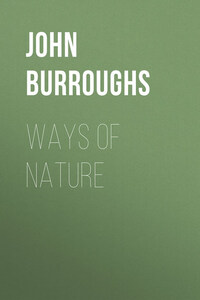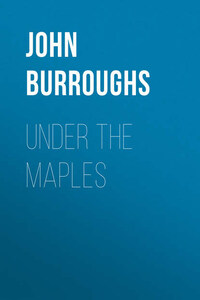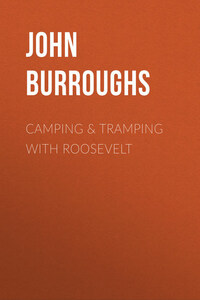My reader will find this volume quite a departure in certain ways from the tone and spirit of my previous books, especially in regard to the subject of animal intelligence. Heretofore I have made the most of every gleam of intelligence of bird or four-footed beast that came under my observation, often, I fancy, making too much of it, and giving the wild creatures credit for more "sense" than they really possessed. The nature lover is always tempted to do this very thing; his tendency is to humanize the wild life about him, and to read his own traits and moods into whatever he looks upon. I have never consciously done this myself, at least to the extent of willfully misleading my reader. But some of our later nature writers have been guilty of this fault, and have so grossly exaggerated and misrepresented the every-day wild life of our fields and woods that their example has caused a strong reaction to take place in my own mind, and has led me to set about examining the whole subject of animal life and instinct in a way I have never done before.
In March, 1903, I contributed to "The Atlantic Monthly" a paper called "Real and Sham Natural History," which was as vigorous a protest as I could make against the growing tendency to humanize the lower animals. The paper was widely read and discussed, and bore fruit in many ways, much of it good and wholesome fruit, but a little of it bitter and acrid. For obvious reasons that paper is not included in this collection. But I have given all the essays that were the outcome of the currents of thought and inquiry that it set going in my mind, and I have given them nearly in the order in which they were written, so that the reader may see the growth of my own mind and opinions in relation to the subject. I confess I have not been fully able to persuade myself that the lower animals ever show anything more than a faint gleam of what we call thought and reflection, – the power to evolve ideas from sense impressions, – except feebly in the case of the dog and the apes, and possibly the elephant. Nearly all the animal behavior that the credulous public looks upon as the outcome of reason is simply the result of the adaptiveness and plasticity of instinct. The animal has impulses and impressions where we have ideas and concepts. Of our faculties I concede to them perception, sense memory, and association of memories, and little else. Without these it would be impossible for their lives to go on.
I am aware that there is much repetition in this volume, and that the names of several of the separate chapters differ much more than do the subjects discussed in them.
When I was a boy on the farm, we used to thrash our grain with the hand-flail. Our custom was to thrash a flooring of sheaves on one side, then turn the sheaves over and thrash them on the other, then unbind them and thrash the loosened straw again, and then finish by turning the whole over and thrashing it once more. I suspect my reader will feel that I have followed the same method in many of these papers. I have thrashed the same straw several times, but I have turned it each time, and I trust have been rewarded by a few additional grains of truth.
Let me hope that the result of the discussion or thrashing will not be to make the reader love the animals less, but rather to love the truth more.
I was much amused lately by a half-dozen or more letters that came to me from some Californian schoolchildren, who wrote to ask if I would please tell them whether or not birds have sense. One little girl said: "I would be pleased if you would write and tell me if birds have sense. I wanted to see if I couldn't be the first one to know." I felt obliged to reply to the children that we ourselves do not have sense enough to know just how much sense the birds and other wild creatures do have, and that they do appear to have some, though their actions are probably the result of what we call instinct, or natural prompting, like that of the bean-stalk when it climbs the pole. Yet a bean-stalk will sometimes show a kind of perversity or depravity that looks like the result of deliberate choice. Each season, among my dozen or more hills of pole-beans, there are usually two or three low-minded plants that will not climb the poles, but go groveling upon the ground, wandering off among the potato-vines or cucumbers, departing utterly from the traditions of their race, becoming shiftless and vagrant. When I lift them up and wind them around the poles and tie them with a wisp of grass, they rarely stay. In some way they seem to get a wrong start in life, or else are degenerates from the first. I have never known anything like this among the wild creatures, though it happens often enough among our own kind. The trouble with the bean is doubtless this: the Lima bean is of South American origin, and in the Southern Hemisphere, beans, it seems, go the other way around the pole; that is, from right to left. When transferred north of the equator, it takes them some time to learn the new way, or from left to right, and a few of them are always backsliding, or departing from the new way and vaguely seeking the old; and not finding this, they become vagabonds.














